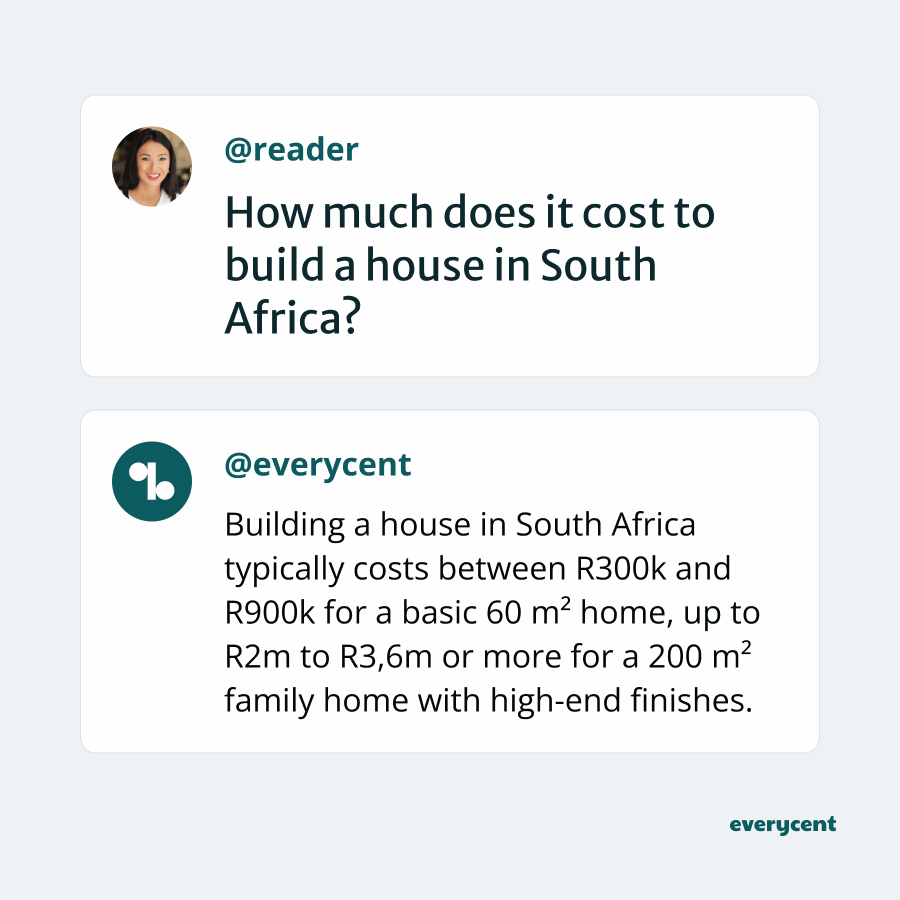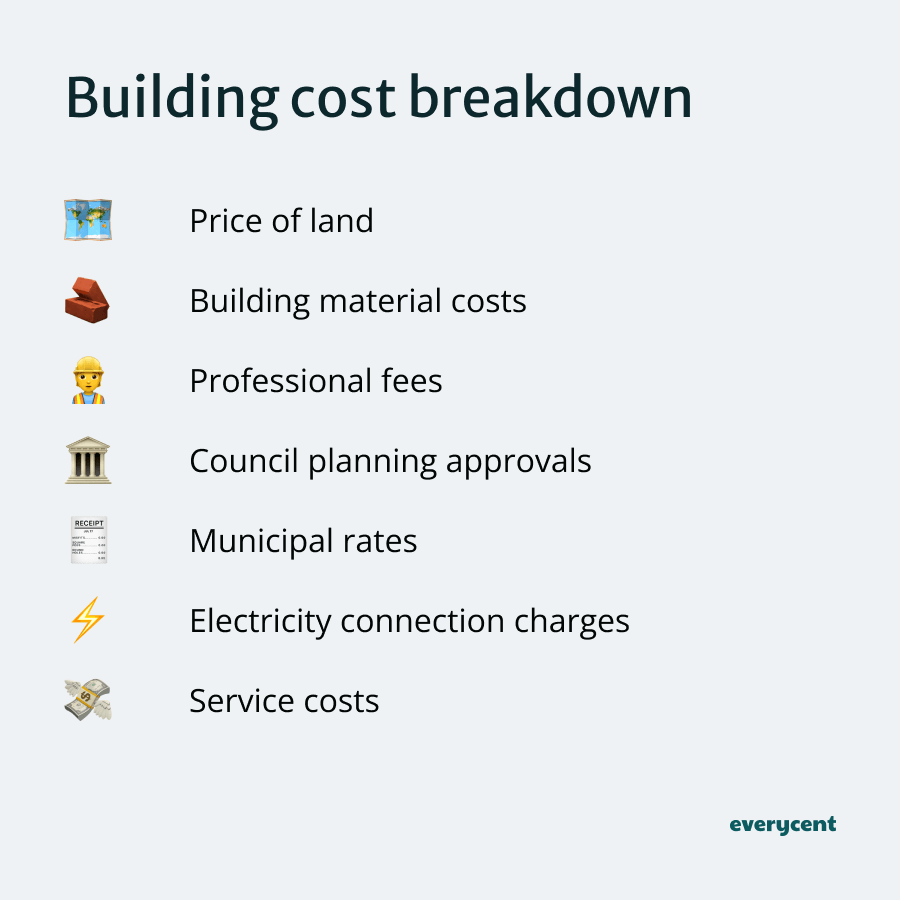Ever wondered what it actually costs to build a house in South Africa?
You may have heard numbers thrown around, but those prices can vary a lot.
Between the size of the home, the location, and unexpected extra costs—there’s a lot to think about before breaking ground.
Here’s a detailed look into building costs in South Africa.
Let’s get started.
How much does it cost to build a house in South Africa?
Building a house in South Africa typically costs between R300,000 and R900,000 for a basic 60 m² home, up to R2,000,000 to R3,600,000 or more for a 200 m² family home with high-end finishes.
Costs vary by province, with building rates ranging from R5,000 to R15,000 per square metre, depending on location and finish level.
For example, KwaZulu Natal and Gauteng tend to be more expensive at R9,000 to R15,000 per square metre, while regions like North West and Limpopo are more affordable at R5,000 to R9,000 per square metre.

Want to check your province? Here’s a table.
Building costs by South African province
| Province | Cost per Square Metre (Range) | 60 m² Home Cost (Range) | 90 m² Home Cost (Range) | 120 m² Home Cost (Range) | 146 m² Home Cost (Range) | 200 m² Home Cost (Range) |
| KwaZulu Natal | R10k – R15k | R600k – R900k | R900k – R1.35m | R1.2m – R1.8m | R1.46m – R2.19m | R2m – R3m |
| Gauteng | R9k – R14k | R540k – R840k | R810k – R1.26m | R1.08m – R1.68m | R1.31m – R2.04m | R1.8m – R2.8m |
| Western Cape | R8.5k – R13k | R510k – R780k | R765k – R1.17m | R1.02m – R1.56m | R1.24m – R1.9m | R1.7m – R2.6m |
| Free State | R7.5k – R12k | R450k – R720k | R675k – R1.08m | R900k – R1.44m | R1.1m – R1.75m | R1.5m – R2.4m |
| Eastern Cape | R7k – R11k | R420k – R660k | R630k – R990k | R840k – R1.32m | R1.02m – R1.61m | R1.4m – R2.2m |
| Northern Cape | R7k – R11k | R420k – R660k | R630k – R990k | R840k – R1.32m | R1.02m – R1.61m | R1.4m – R2.2m |
| Mpumalanga | R6k – R10k | R360k – R600k | R540k – R900k | R720k – R1.2m | R876k – R1.46m | R1.2m – R2m |
| Limpopo | R5.5k – R9k | R330k – R540k | R495k – R810k | R660k – R1.08m | R803k – R1.31m | R1.1m – R1.8m |
| North West | R5k – R8k | R300k – R480k | R450k – R720k | R600k – R960k | R730k – R1.17m | R1m – R1.6m |
Where do we get these numbers?
Good question. We did a lot of digging to find as many references as possible, compiled and cross-checked the data, then drafted this table with the average findings.
It may not be perfect, but it’s probably the most comprehensive source you’ll find online.
Remember, costs depend on several other factors, including location, design preferences, and building materials.
📖 Related content:
Struggling to pay your debt bills? Check to see if you qualify to lower your debt instalment and free up money for other expenses.
Building cost per square metre
Building costs per square metre in South Africa generally range from R5,000 to R15,000, depending on the province and level of finishes. Higher costs are typically seen in urban areas like Johannesburg and Cape Town, where prices may range from R9,000 to R15,000 per square metre, while more affordable rates of R5,000 to R9,000 per square metre are common in regions like Limpopo and North West.
Things to keep in mind:
- Rates vary by region, with urban centres generally costing more than smaller towns or rural areas.
- The rate covers basic construction expenses, but additional costs, such as high-end interior finishes, landscaping, and utility connections, can significantly impact the final total.
The big takeaway? The final price tag really depends on the finishes and where you’re building.
Now, let’s put these numbers to work…
How to calculate the square metre of a house
To calculate the square metre area of a house, measure the length and width of each room, then multiply these dimensions. For example, a room that is 5 metres by 4 metres equals 20 square metres. Add up the square metres of all rooms and enclosed areas for the total house area.
Steps:
- Measure the length and width of each room or section, then multiply these two figures.
- Add up the square metres for all rooms, garages, and other enclosed spaces to get the total area.
Example:
A room that is 5 metres by 4 metres covers 20 square metres. A house with 3 rooms that are all 5 metres by 4 metres is 60 square metres.
- Room 1: 5m x 4m = 20m²
- Room 2: 5m x 4m = 20m²
- Room 3: 5m x 4m = 20m²
- House: 20m² + 20m² + 20m² = 60m²
Makes sense, right?
Doing these basic calculations will allow you to work out how much your house could cost.
If you’re frugal (like me), you may be wondering why it’s so expensive or what goes into that square metre price tag?
Let’s take a look.
Building cost breakdown
The main costs of building a house in South Africa include land purchase, building materials, professional fees, and utility connections. Additional costs often cover council approvals, municipal rates, and landscaping. Together, these costs make up the total cost to build a home.
(With some variation for fancier finishes, of course.)

Here is a breakdown of the main costs involved:
- Price of land
- Building material costs
- Professional fees
- Council planning approvals
- Municipal rates
- Electricity connection charges
- Service costs
- Additional fees
Price of land: The cost of the land itself. Which varies greatly by location and desirability.
Building material costs: Includes bricks, cement, roofing, windows, doors, and other essential materials. Material quality and availability significantly impact the price.
Professional fees: Fees for architects, engineers, and contractors for their planning, design, and project management services.
Council planning approvals: Fees for obtaining necessary permits and approvals from local authorities.
Municipal rates: Local property taxes are assessed based on the value of the property, which vary by municipality and may include levies for basic services.
Electricity connection charges: Fees for connecting the home to the electrical grid.
Service costs: Fees associated with connecting water, sewage, internet, and other essential services, which may also include deposits or setup charges.
Additional fees: Costs for surveys, legal fees, or landscaping and finishes, depending on the project’s scope.
Each of these costs can vary. Together, they determine how much it’ll cost to build a house in South Africa.
Earlier, we pointed out that certain regions are more expensive than others. Let’s find out why…
Regional cost comparisons
The cost of building a home varies greatly depending on the region in South Africa. Where certain provinces, and even areas within those provinces have either higher or lower building costs. In urban centres like Cape Town and Johannesburg, building costs tend to be higher due to:
- Increased demand
- Higher property prices
- Logistical costs for materials
Cities and densely populated areas tend to be more expensive. Because demand drives up the cost of everything in the area. While smaller towns or rural areas, generally enjoy lower construction costs.
This low-cost vs high-cost dilemma is a double-edged sword.
Houses in more expensive regions may be easier to sell later on. Plus, the value in these areas could make the value of the house go up.
Struggling to pay your debt bills?
Okay, so that’s the cost.
Now, is it worth building? Or should you buy instead?
Is it cheaper to buy or build a house?
Buying a house is generally cheaper upfront than building one. Building a house in South Africa allows for full customization but often involves higher upfront costs and a longer timeline. Buying an existing home can be quicker and may cost less upfront, but it offers fewer customization options and can include transfer duties and renovation fees.
The choice depends on budget, timeline, and personal preference.
Let’s compare both options…
Building vs buying a house
Here’s a comparison of building vs buying:
| Building vs Buying a House | Building a House | Buying a House |
| Customization | Fully customizable | Limited customization |
| Upfront Costs | Higher upfront costs; risk of unexpected costs | Generally more affordable upfront; may include transfer duties |
| Timeline | Longer to complete | Faster move-in |
| Convenience | Requires extensive planning and coordination | Generally more convenient |
| Renovation Costs | Unlikely, as everything is new | May need renovations |
Which would you choose—the custom route or a quick move-in?
📖 Related content: Best investments in South Africa
In summary
There you have it—a look into what it takes to build a house in South Africa.
We got through everything from the costs to important regional factors.
The bottom line is that building a house requires careful budgeting and planning.
Whether you build it or buy it—we hope you get to move into your dream home soon!
Want to learn more? Keep reading on Everycent.